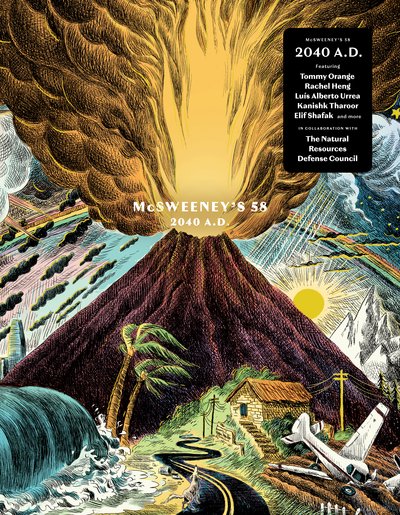
This review will contain some details that some may consider spoilers. Proceed at your own discretion.
McSweeney’s 58: 2040 A.D. is a climate fiction collection to be reckoned with. The writing is thoughtful and beautiful, and represents an array of perspectives on the climate emergency, conveniently labelled with the geographical location of that perspective. Mikael Awake’s “The Good Plan” is the only story in McSweeney’s 58 that doesn’t identify the location of the author within the margin of the story itself. Instead, the author’s location is cited as “Somewhere in the Northern Hemisphere” which provides some context for the story through what it tells the reader and what is omitted. Awake’s story reveals the experience of climate refugees through its exploration of memory and feelings of belonging and displacement. It is a study in physical, emotional, and psychological displacement and reintegration, one which masterfully gives the reader a taste of that experience in what Awake chooses to disclose or obfuscate about a refugee’s experience.
Remembering and forgetting is central to this refugee protagonist’s experience. In the first paragraph, Awake centres the struggle between remembering in order to preserve something of the person the protagonist was before he became a refugee, and forgetting in order to survive the present within the “plan” imposed upon him. At the core of this struggle is the idea of home — where is home when you leave the only place you’ve known? Can home be remade or recuperated elsewhere? For Awake’s protagonist, home is his dying mother, whom he has left behind and wants desperately to get back to again. Despite this desire, he left his mother to go to the land of The Good People in order to improve his family’s situation.
Relationship is key to survival in “The Good Plan.” But the Good People in the story demand, as a part of the Good Plan, that the protagonist exchange memories for the money he needs to survive. Without memories, the protagonist loses himself, his connections to others, and his sense of purpose. But Awake depicts memory as tenacious. In the land of the Good Plan, the protagonist participates in an economy of memory and experience for security; but he is able to hang on to the memory of his sister. While memories dissolve into the protagonist’s refugee experience, and he gives up still more of his memories in order to appear compliant of The Good Plan, the protagonist is reunited with his family when he is deported.
Deportation is yet another disorientation, but in the community of the Rear (as in, at the back of the line to travel, once again, to the land of the Good People), the protagonist discovers his mother vibrant and healthy and his sister strong. In community, then, Awake’s protagonist recovers himself: at first through regaining the memory and knowledge of familiar foods and music, and then through having a stake in the land and the people who love it. Through relationship, too, “the land … [remembers] itself.” This remembering is no primitivist utopia: the Rear is a fully modern, technological settlement which redefines human relationships to the land.
In “The Good Plan,” Awake’s prose obliterates both geographical and ideological borders and rebuilds the reader along with the protagonist and his community. “The Good Plan” is essential reading for understanding the intersections between environmental justice and migrant justice.
